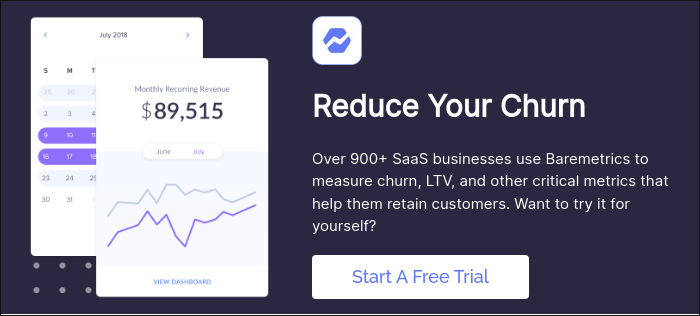Table of Contents

Subscription billing is a payment structure that allows service providers to charge their clients based on a fixed timeframe.
This article will help you with everything you need to know about subscription billing and subscription billing solutions.
Baremetrics is a business metrics tool for SaaS. You can use Baremetrics to improve your SaaS or e-commerce business and fully optimize your subscription billing.
Click here to start our free 14-day trial.
What does subscription billing mean?
While the expression has been in use for quite some time, the term remains unclear to several people.
Simply defined, subscription billing is a payment arrangement made for a product or service, where a service provider or product merchant charges for a service or product on a defined schedule.
This schedule can be weekly, monthly, quarterly, annually, or on any other timeframe as scheduled.
Subscription billing has grown popular among several individuals and organizations across several industries. This is largely due to the way that it gives recurring payments.
Key requirements of subscription billing
Here are some of the basic requirements required for brands to fully optimize subscription billing.
1. You should work with a recurring billing platform
Once customers choose to subscribe to your brand, you must be able to facilitate subsequent payments without any hassle with your billing process.
Nowadays, there are several payment processing platforms available to help with your workflow, especially for credit card payments.
2. Product/service offers should be offered in tiers
By having your product/service subscription plans in different tiers, you are offering customers multiple options, which is a major competitive advantage as you can cover a wider range of customers.
Each subscription tier should come with varying levels, allowing users to choose based on their preferences.
3. Better customer management and decreasing churn
Considering the information obtained from customer subscription history, your business should be able to make effective customer management decisions.
This is why a billing solution needs to store necessary information on customer experience, behavior, and preferences.
This information helps you improve customer relationships with your brand and increase customer retention.
4. Self-service access
To run a successful subscription billing system, customers should be able to easily navigate your product/service page and subscribe without having to engage with support services.
The payment methods offered should be easy and convenient to use.
5. Automated billing flows and analytics
To improve the efficiency of automated billing flows and analytics, it is important to automate the entire payment system from withdrawals to invoicing and even analytics.
Automating this process makes your job easier and also improves the efficiency of your cashflow reports.
With automated reports, you don’t have to go through so much hassle to get the metrics needed to make important business decisions as you can generate fiscal life-cycle reports conveniently.
Subscription Billing Systems Allow More Returns on Investments
Get deep insights into MRR, churn, LTV and more to grow your business
Why businesses need subscription billing
The number of subscription-based businesses is increasing around the world. Here are some reasons why you might also want to consider a subscription system for your SaaS or e-commerce business.
1. Increased customer base
Subscription billing often makes products and services seemingly more affordable for customers, thereby increasing the number of people that choose your product/service.
Rather than make a huge one-off payment, it allows users to make more affordable payments on a scheduled basis for as long as they would love to enjoy the product or service.
2. Recurring billing systems offer more returns for customer acquisition costs
With a subscription billing system, you repeatedly get more returns on all your investments. This enables customer acquisition, as the length of time the customer spends with your brand is increased.
3. Improved revenue structure
Subscription services also help you improve the predictability of your revenue.
With an efficient subscription analytics tool, you can make real-time revenue estimations using relevant data from your billing history.
Baremetrics Subscription Analytics Tool
Baremetrics is a subscription analytics tool for individual brands and organizations. The tool provides the essential metrics required to make the best decisions for the growth of their companies.
From tracking the locations with the highest number of subscribers to segmenting customers based on preferred criteria and many other functions.
Baremetrics can be conveniently integrated with several payment methods and billing software, including Stripe, Checkout, Recurly, Google Play, Shopify, App Store Connect, etc. This is to provide optimal functionality and make it even more convenient for you.
You can check out a live demo now to see how Baremetrics works.
Why Choose Baremetrics?
Currently, subscription billing is rapidly taking over as many companies are opting for these systems. This is majorly due to the improved efficiency offered by Baremetrics.
However, beyond merely automation payments, Baremetrics provides a more wholesome approach to managing your subscription system.
The solution is designed to generate all the essential figures and metrics to improve your customer management and make the best business decisions.
Get started with a Baremetrics free trial today to optimize your subscription billing system.



